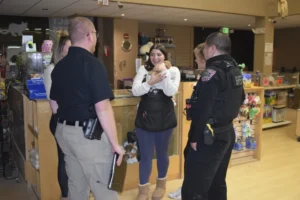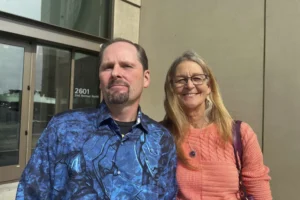Jackson Police Chief Focuses on New Initiatives to Improve Police Force
Weber seeks to make police force more responsive to the community
- Published In: Criminal Justice
- Last Updated: Apr 08, 2022

Jackson Police Chief Michelle Weber has several priorities for improving the police force including sexual assault response; mental health for officers and other staff; recruiting; retention; training; and community engagement. The initiatives involve working hand-in-hand with the community as a police force. (Wyoming Truth photo by Alex Bontecou)
By Kristi Eaton
Special to the Wyoming Truth
Jackson Police Chief Michelle Weber is used to blazing a trail, whether that be in her career in law enforcement or outside on a long run.
Weber, who started with the police department in 2004, has moved up the ranks, including in such positions as patrol, investigations and support sergeant. She was tapped to lead the department on an interim basis about a year and a half ago and officially became chief about a year ago.
Since then, she has identified several priorities for Jackson’s police force, which, when fully staffed, includes 50 staff members, 32 of which are sworn officers and two reserve officers.
“When I started, I essentially had been working on a long-term strategic plan so I could keep focused,” she said in an interview with the Wyoming Truth. “I think results are really important—metrics are really important. It’s hard to measure. How do you measure success, right? And so, for me, I wanted to be able to go, OK, well, in a year or two years, or three years or four years, this is where I want to see our department go.”
The priorities are: sexual assault response; mental health for officers and other staff; recruiting; retention; training; and community engagement. All six initiatives involve working hand-in-hand with the community as a police force.
Take, for example, the interview room at the police department. Weber describes it as “a closet,” basically an interrogation room. Both victims and suspects are interviewed in the room.
Weber envisions what she calls a “soft interview room” for victims; it would be a larger, more comfortable room with chairs, a table, a couch, pictures and a rug .
That room, however, will have a dual purpose. Not only will it be used for interviews, it will also be where officers and other personnel can go for a respite during a hectic day. It will be neutral and comfortable, she said.
It will be “designed in such a way that officers could actually go down there and spend two minutes to decompress and do some mindfulness” exercises, Weber said. “And they’ll have resources available to them to do a 10-minute breathing technique.”
This is especially important as they deal with the stress of their jobs, coupled with the pandemic. She noted that, at one point last summer, 16 employees were in what’s called the 333 trauma response, a protocol determined by factors happening on the job and in their personal life. Officers responded to a variety of emergencies in Jackson, including a series of suicides and suicide attempts as well as domestic violence and sexual assaults, Weber said. In addition, officers were struggling with the mental toll of COVID-19, while others confronted personal issues.
In response, the department is now focusing more on the mental health of its own officers and personnel.
“So, we do check-ins three days, three weeks, in three months to say, ‘How are you doing?’” she said. “And part of this peer support program is they will be given access to counselors, and it’s confidential.”
Weber is also excited about the social worker she has hired to embed in the police department. Jackson is believed to be the first city in Wyoming to hire such an embedded social worker. Through the first half of 2021, the Jackson Police Department saw a 36 percent increase in crisis-related calls compared to 2020.
“I really have big plans for that program. I just think we can do so many things,” she said, adding that she also has funds for a therapy dog program. Details of the program are still being worked out, but Weber envisions the dog being available for calls and to assist the social worker, who is not yet on the payroll.
Training is an important component to Weber, noting she wants officers to feel comfortable in the community and the community to feel comfortable with the officers.
“If you don’t train every day, you lose those skills,” she said. “If you don’t constantly retrain and refresh, you lose the ability to, you know, to have that fresh on your mind.”
She added: “We can always be better, so my goal is to create an environment where people don’t want to leave and don’t want to get out of law enforcement.”
Retention efforts are working as the department has not lost anyone since she began leading the force. But she said she doesn’t take anything for granted. Weber said the most common complaints from officers are about the cost of housing and level of pay.
In another initiative, Weber plans to train officers in Spanish. Nearly 3,300 of Teton County’s 23,000 residents identify as Hispanic or Latino, according to U.S. Census Bureau data.
“I have funding to send officers to a pretty intensive three-week Spanish immersion class where they’ll live with a family and learn more than just law enforcement [phrases]. It’s like conversational Spanish,” Weber said. About six officers are fluent in Spanish and more are conversational.
Weber, who runs every day and has completed two ultramarathons, races longer than the typical marathon of 26.2 miles, wants to start a Citizens Academy, though she added that she wants to focus on the other priorities first. Citizens Academies typically train community members to interact with officers and learn about law enforcement practices.
Sgt. Tony Matthews has worked in the police force for 25 years, so he has seen Weber climb the ladder.
“I am impressed with Chief Weber’s initiatives,” he said. “Most of them have to do with bettering the mental health of both the Police Department and the community. She has been working to change unhealthy paradigms—something long overdue to extend the lives and careers of our police officers.”
Matthews said Weber has made the department a “caring environment” not just because of the mental health initiative but because of her ability to listen.
“She listens for department members for them to be heard and their ideas to be implemented,” he said.
People often make generalizations about police officers, he said.
“Most people really do get into law enforcement to help people,” he said. “And when they go to calls for service, they want to serve people as best they are able. So, when negativity or generalizations happen, officers usually internalize it—making a stressful job more stressful.”
When dealing with conflict in the field, he said, officers may go into a fight, flight or freeze response. “Sometimes they experience a contracting of their arteries, tunnel vision or auditory exclusion to mention a few,” he added.
Weber, he said, has made it a priority so that new officers are exposed to mindfulness or breathing processes to combat inappropriate physiological responses.
Lt. Russ Ruschill, who has been with the police force for 19 years, said that under Weber’s leadership, the department has improved its responses in certain areas.
“For the first time in my career, we have a dedicated detective assigned to a sexual assault response position,” he said. “From the lessons of the past, we have learned that our community wants us to make intimate partner violence and sexual abuse a priority. We have always responded to these types of calls well, but Chief Weber’s initiatives are taking us to a more professional level.”
Ruschill is pleased with the changes so far: “Chief Weber was well prepared to take the reins of this organization and has implemented many new and innovative things which have improved the morale of the employees, the quality of the services we provide to the public, and safety of our employees.”













